If you are looking wholesale lighting solutions, click here.

Ever wondered what the difference is between MR16 and GU10 bulbs? Well, you are not alone; most people buying the light bulb ask this exact question, so that they can choose the one that best suits their needs.
The MR16 and GU10 bulbs may appear similar, but they are technically different. Here in this guide, we will explain the differences between MR16 and GU10 to help you make the right choice.
A simple comparison of MR16 and GU10 light bulbs is given below to help you figure out the right one for your commercial or residential property.
| Feature | MR16 | GU10 |
|---|---|---|
| Base Type | The MR16 bulb features a GU5.3 (2-pin-push-in) base type. | The base type of this light bulb is GU10 (twist-lock) |
| Voltage | These bulbs run on low voltage. 12V is enough for MR16 bulbs. | These bulbs operate at a line voltage of 120V / 240V. |
| Needs Transformer | Yes | No |
| Installation | Installing this bulb type is complex | This bulb type can be installed easily |
| Typical Applications | MR16 is used in track lights and spotlights | GU10 is also used in track lights and spotlights. |
| LED/Smart Compatibility | Moderate Compatibility | Good Compatibility |
In MR16, MR stands for Multifaceted Reflector, referring to the internal design that controls light direction. The “16” refers to the bulb’s diameter, measured in eighths of an inch, i.e., 16/2 equals 2 inches.
The base of the MR16 bulb is a GU5.3 base type (with a 2-pin connector). These bulbs operate on low voltage, i.e., 12 V; hence, these bulbs need a transformer to convert the actual voltage (i.e., 120V or 240V) to 12V.
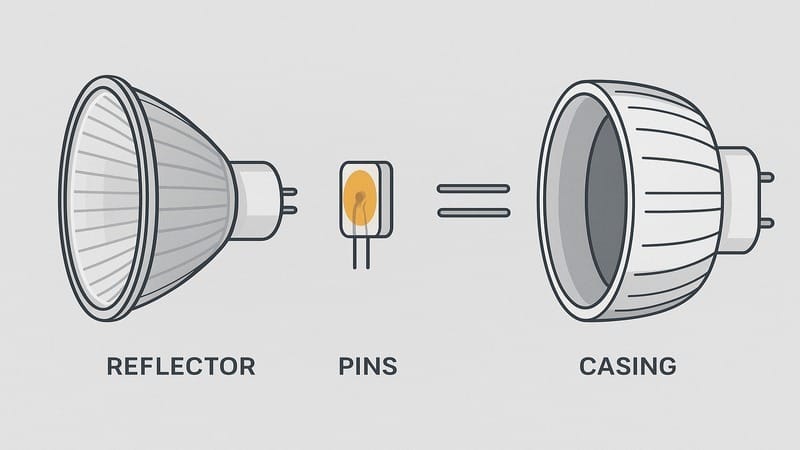
These light bulbs are used in indoor lighting fixtures, i.e., recessed downlights, retail displays, art galleries, and track lighting, and where focused lighting is required. LED MR16 bulbs can function with MR16 fixtures.
However, it is important to note that when switching to MR16 LED alternatives, ensure transformer compatibility is checked, as not all transformers are intended to be used with LEDs. Make sure to choose a transformer that suits your MR16 LEDs.
Our MR16 smart bulbs are now becoming popular. These lighting options offer automated control, scheduling, and colour tuning. However, they must be paired with a compatible low-voltage transformer to function properly
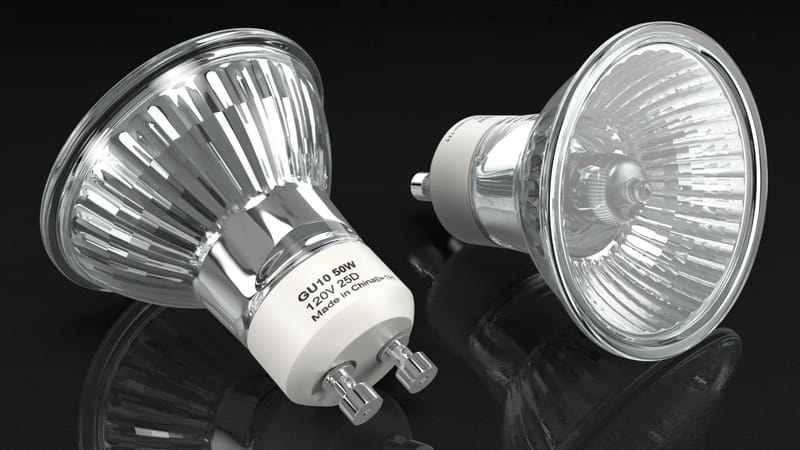
The GU in GU10 refers to general use; this indicates that these bulbs are commonly used as a general lighting source. The GU10 bulb has a twist-and-lock bi-pin base; whereas 10 indicates that the difference between the two pins is 10mm.
MR16 has a push-in base with two pins, which push the MR16 bulb into the socket. Whereas GU10 features a twist-lock base, owing to the base type, GU10 bulbs are easier to install.
These halogen bulbs operate directly on the main voltage, i.e., 120 V or 240 V; this is the reason why these bulbs don’t need any transformer to operate. The ease of installation adds to making GU10 a popular choice for homeowners, electricians, and commercial lighting fixtures.
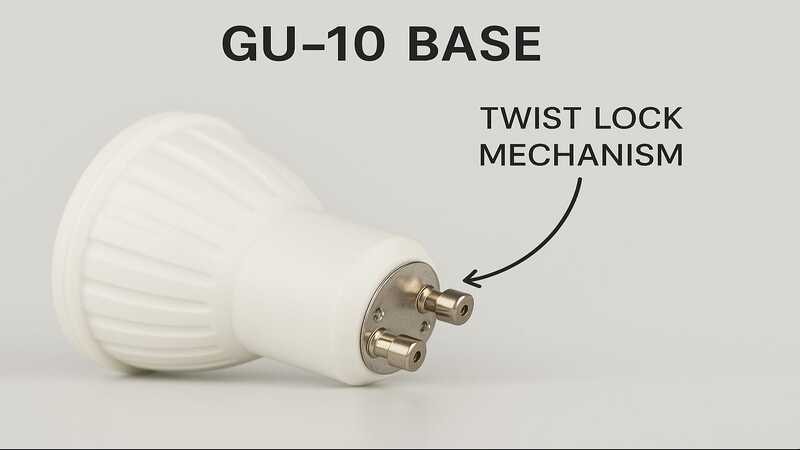
GU10 bulbs, with their small size and focused lighting beam, are popularly used in ceiling spotlights, track lighting, kitchen, and hallway fixtures.
Also, you can directly replace GU10 bulbs with GU10 LED lighting alternatives. GU10 operates on the main voltage and doesn’t need any transformer or external LED drivers.
The key differences between the mentioned types are as follows:
The base is the part of the bulb that connects it to the lighting source. MR16 and GU10 differentiate from one another based on their base type.
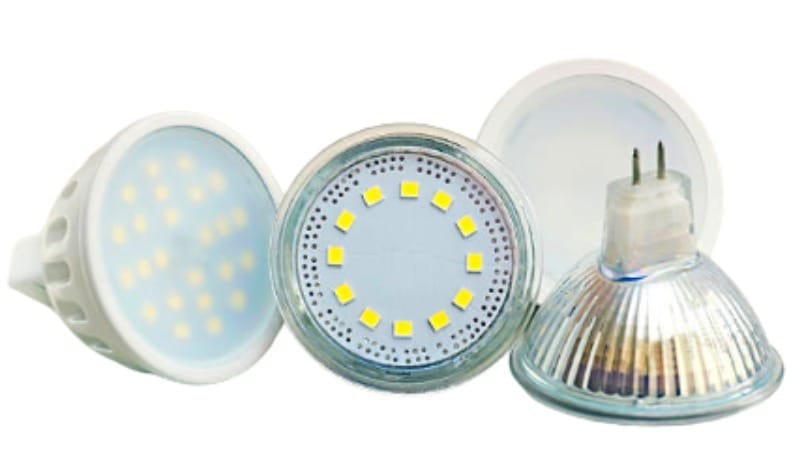
MR16 bulbs use a GU5.3 base, which features two thin pins that push into the socket. Installing these bulbs is a bit tricky.
GU10 bulbs have a twist-lock base, with two short, thick pins spaced 10 mm apart. They fit safely into the socket, making installation simpler, especially in ceiling fixtures.
Note that the bases are not interchangeable, so make sure to check your fixture before purchasing any light source.
The other thing that differentiates these types is the voltage they run on. MR16 bulbs need low voltage to operate, i.e., 12V is enough for these light bulbs to operate. However, GU10 bulbs work on the actual voltage, i.e., 120V in the US and 240V in the UK/EU.
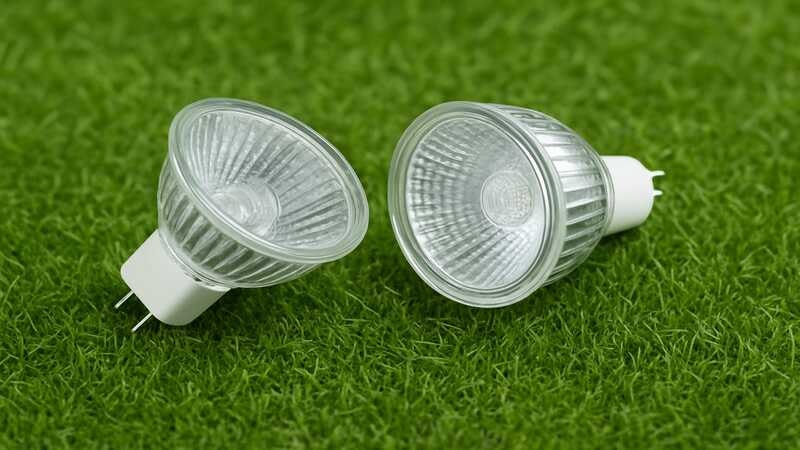
MR16 bulbs need a transformer to reduce the main voltage; however, GU10 bulbs do not need one. If you are looking to switch to LED alternatives soon, it is advised to choose GU10.
The bulbs may look the same at first glance; however, they cannot be used interchangeably at all. Both these bulbs differ in terms of their base type, voltage, and fixture design.
So, if you are upgrading your lighting from halogen to LED, make sure that the new light bulb type is adjustable with the fixture.

Installing MR16 is tricky, especially if you are upgrading to LED. On the other hand, installing GU10 is simple and can be carried out within seconds.
Both MR16 and GU10 are available in LED and smart versions. GU10 smart LED light bulbs are commonly used and can be used in place of GU10 halogen bulbs easily.
MR16 bulbs are also available in LED smart options. But as mentioned before, they need a 12V transformer, thus contributing to the complexity of installation. The advanced LED technology further adds to the popularity of these light bulbs.
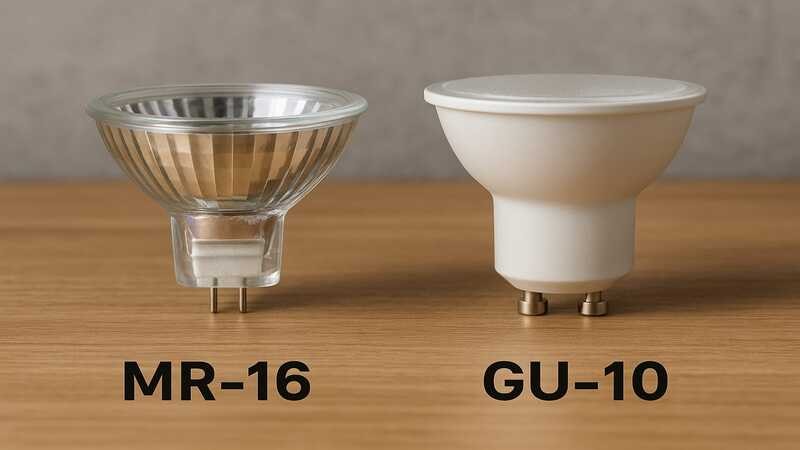
When choosing the light bulb for your setup, the first thing you need to consider is whether you are working with an existing fixture or installing a new one.
If you already have the fixture installed, check the base type. If the base type is GU5.3, then it is an MR16 bulb, and if it’s a GU10 base, then the bulb is GU10 type.

In case you are buying or designing a new fixture, then it is recommended to opt for GU10 as it functions with the actual voltage, is simple to install, and needs lower maintenance. Also, GU10 fixtures are compact and thus add to the aesthetics of modern and minimalistic interiors.
MR16 and GU10 light bulbs both have smart options available. Smart MR16 bulbs offer app control, assistant support, and dimming features.
The drawback is that they require a compatible transformer, so one needs to ensure transformer compatibility while installing smart LED MR16 bulbs.

Alternatively, GU10 smart bulbs run on 120V/240V without a transformer. They are easy and quick to upgrade and offer features like voice control, colour changing, automation, and remote control. GU10 smart bulbs are generally recommended for modern setups.
While choosing a light bulb, always ensure to check your fixture’s base type and voltage needs. MR16 needs an added external source for balancing voltage and energy efficiency, while GU10 connects directly to the power source; thus, it is ideal for quick and easy upgrades.
No matter whether you’re choosing MR16, GU10, or any other type of light bulb, always choose a reliable supplier to get benefits in the long run.
At Risun Corp, with over a decade of lighting expertise, we offer high-quality GU10 and MR16 bulbs. Our staff is experienced and skilled enough to meet your unique retail or wholesale requirements.
No matter whether you want lights for your homes or high-quality yet cost-effective lighting solutions for your business, Risun Corp can meet all your needs.
Contact our team to request a bulk quote today and give us a chance to improve your business.
The main difference between these LED downlights is that the MR16 uses a 2-pin GU5.3 base and requires a 12V transformer, while GU10 has a twist-lock base and runs directly on 120V or 240V main power.
No, GU10 LED light bulbs are not being phased out. They remain popular due to their compatibility with the main voltage. Ease of installation further adds to the popularity of these light bulbs.
However, with the availability of energy-efficient, eco-friendly, and technologically advanced products, people do give GU10 bulbs a second priority.
Comprehensive Lighting Solutions for MRO Wholesalers and Professionals
send your inquiry
Hi, I'm the author of this post, and I have been in this field for more than 15 years. If you want to wholesale lighting fixtures or lighting related product, feel free to ask me any questions.
Learn More >>Download our catalog to view all of our lighting products.
Ready to get started ?
Send Your InquiryOur team will get back to you promptly

please
download
Get notified about new products
Our team will get back to you promptly!
Add your first comment to this post